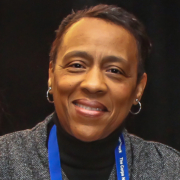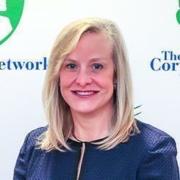
By Sydni Dobson
For Women’s History Month and International Women’s Day, we’re highlighting the Distinguished Womxn of Linville trail crew – the first identity-based program at Conservation Corps North Carolina (CCNC). We interviewed Andy Sommerville, Field Program Coordinator of CCNC, and Distinguished Womxen of Linville AmeriCorps members Emily Kerscher and Madeline Coggins.
This program was made possible with support from the National Park Foundation, AmeriCorps and the National Park Service. Between June and October of 2020, the Distinguished Womxn of Linville AmeriCorps members engaged in an ambitious trail rehabilitation project at Linville Falls, one of the most popular destinations along the Blue Ridge Parkway. Learn more about this project.*
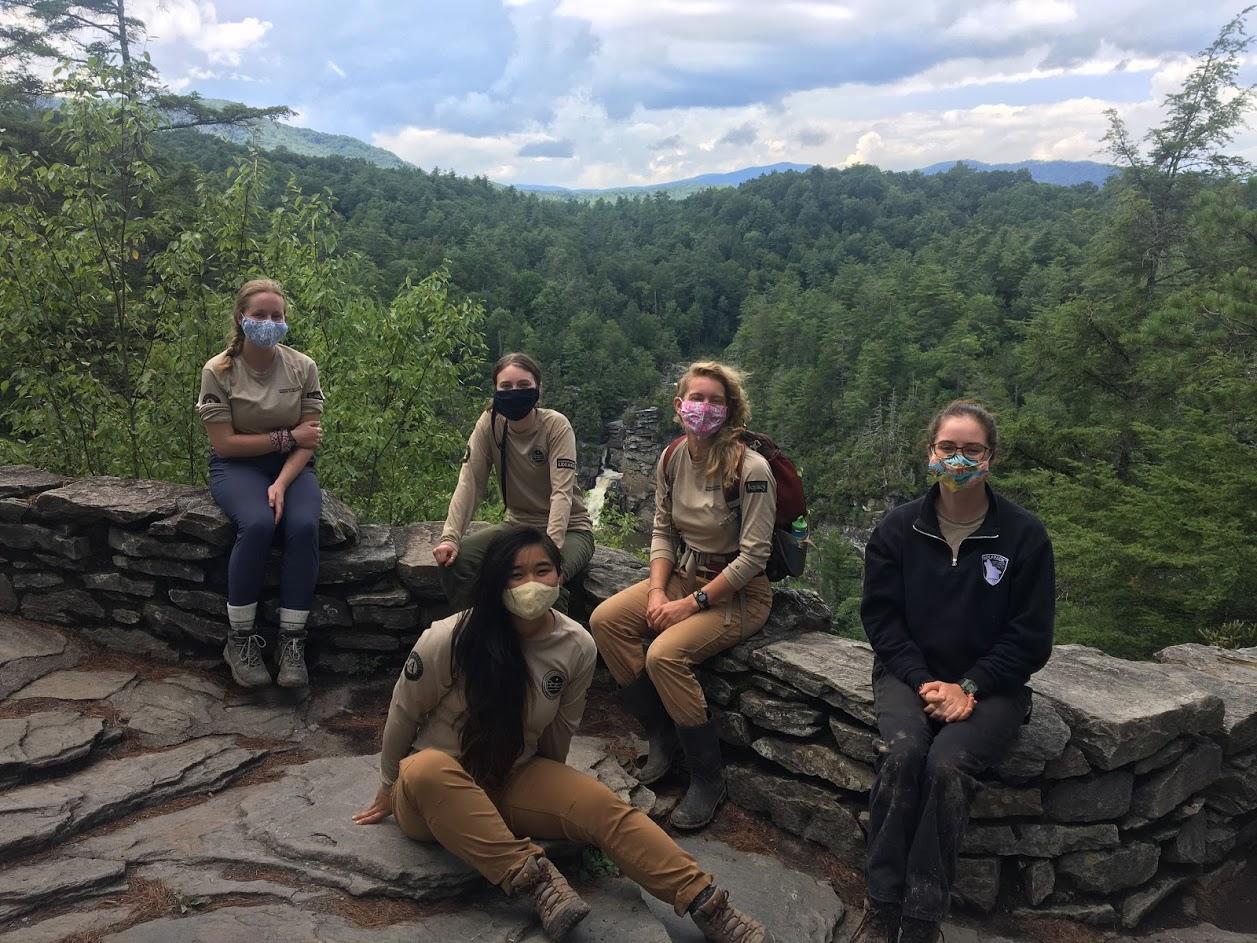 When and why was this crew formed?
When and why was this crew formed?
Andy: This crew officially started on June 29, 2020. It was an effort of CCNC and Conservation Legacy; Jan Pender, Conservation Corps Program Manager, was a big driver in getting this crew together. Our partners were excited and ready to have single binary identity crews. We saw that as something we want to further upon and instill into conservation service work.
Where are the majority of the Corpsmembers from and how did they learn about this program?
Andy: We have a couple from North Carolina, one from Southern California, one from Alabama, and the rest are from the Northeast region.
A couple of Corpsmembers came from conservation and natural resource backgrounds and were looking for opportunities to further their experience in an immersive crew. An immersive crew is “hitch-based,” meaning they camp out and stay the night where they’re working. For the Crew Leaders, we had a couple return from serving on a conservation crew in 2019.
What type of projects does the crew focus on?
Andy: This crew solely focuses on trail work. For our partner at the National Park Service, a lot of issues they’re experiencing are rooted in soil erosion. Erosion from trails is detrimental to the health of the watershed in riparian areas, creeks, streams, etc. It’s very important to make sure trail work is done properly so water flows in the correct way off the trail and not taking a bunch of soil off and dumping it into our watershed. You would think that trail work is just carving a trail, but it’s actually about erosion control. Our crew is trying to make something last as long as possible, and not worry about it washing away and creating some real issues downstream.
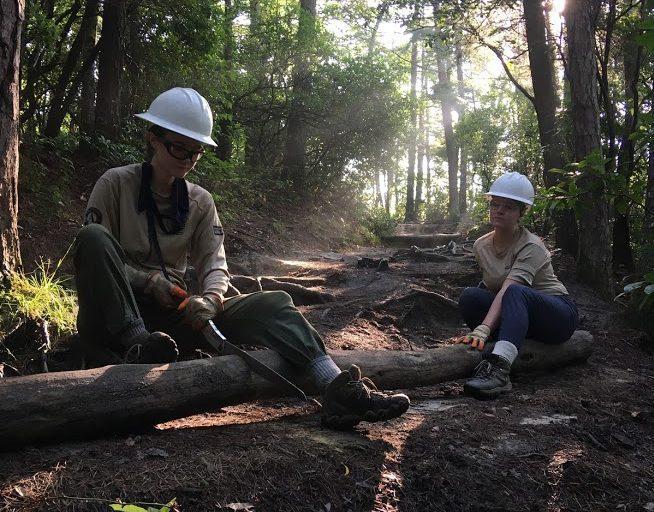
Describe an average day of service.
Andy: The crew gets up around 6:00 a.m. to make breakfast together. They’ll get tasked by the Crew Leaders to gather water and tools, and then lock up the trailer to make sure tents are closed. By 7:00 a.m., they drive to the Linville Falls Visitor Center and begin stretching and form a safety circle. The safety circle warns the crew about the potential dangers that day. By 7:30 a.m., they head up on the trail with tools in hand and start lining out their work. As a team of six, the group splits up into groups of two or three. Bouncing around to different tasks throughout the day, the crew works until about 3:30 p.m and then heads back to the camping site. When the girls arrive back, they clean and sharpen their tools, then get ready to prepare dinner together. After a long day of work, the crew is usually in the bed by 8:30 p.m.
Can you talk about your most memorable moment serving with the Distinguished Womxn of Linville?
Madeline: One of my favorite memories from our time in Linville was an interaction our crew had with a family from the campground. It was day nine of the hitch and we were all feeling quite drained from the week. We had brought our tools back to the campground to sharpen. When we were almost finished, we heard a young girl exclaiming, “Those are the trail girls!” I turned around to see a small girl running through the campground trying to get her parents and sister to notice “the trail girls!,” she was so excited. We waved at the family, and the parents came over to say hello. We talked with her parents and told them about our work and how their daughters could get involved in conservation and the national parks. It was rejuvenating seeing someone so enthralled with our crew and the work we were doing. I also felt empowered knowing we were setting an example and inspiring the next generation of women and trailblazers.
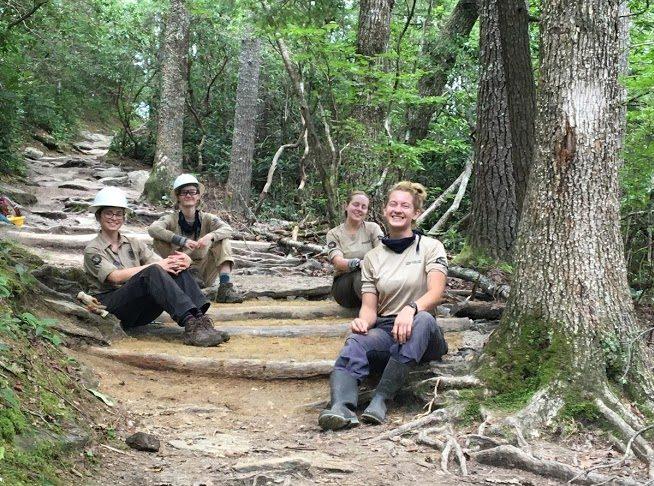
What do you think the crew has learned during their time in the program?
Andy: Conservation work is hard, gritty, and dirty. What a lot of our Corpsmembers get out of it is the bonding experience between one another, with other members, and with visitors. It’s awesome to get feedback from little girls and whoever else is using the trail. It is so cool to hear from people, “Thank you so much for the work you’re doing.”
Little girls look up to our crew and see them as heroes on the trail. A takeaway from this experience is that working as a crew towards a common goal, while trusting one another and being comfortable around each other, is important to the actual achievement of that goal. The crew has achieved a tremendous amount of work. Sometimes that is impossible if you’re not working with people that you care about and want to work with and want to help out in getting that goal accomplished together.
In comparison to your other service terms with different Corps organization, how was it different working with an all Womxn’s crew? Or was there any difference at all?
Emily: Every crew family is unique, and the two groups of womxn who made up our summer and fall crews created two distinct family experiences. I think the idea of it being an all-womxn’s crew provides a beautiful commonality at the foundation, yet leaves space for the individual members to shape around that whatever crew culture feels right.
Why do you feel that single identity crews like this are important for conservation?
Andy: Representation matters. There are so many people getting out on the trail these days. We want to create an avenue and showcase that anyone is capable of doing this type of work. Manual labor doesn’t have any type of barriers on gender or preference. It’s not about your personal preference, it’s about your presumption and drive. I think it’s important for anyone to be part of something they care about. If someone cares about it, they should have access to be able to experience it.
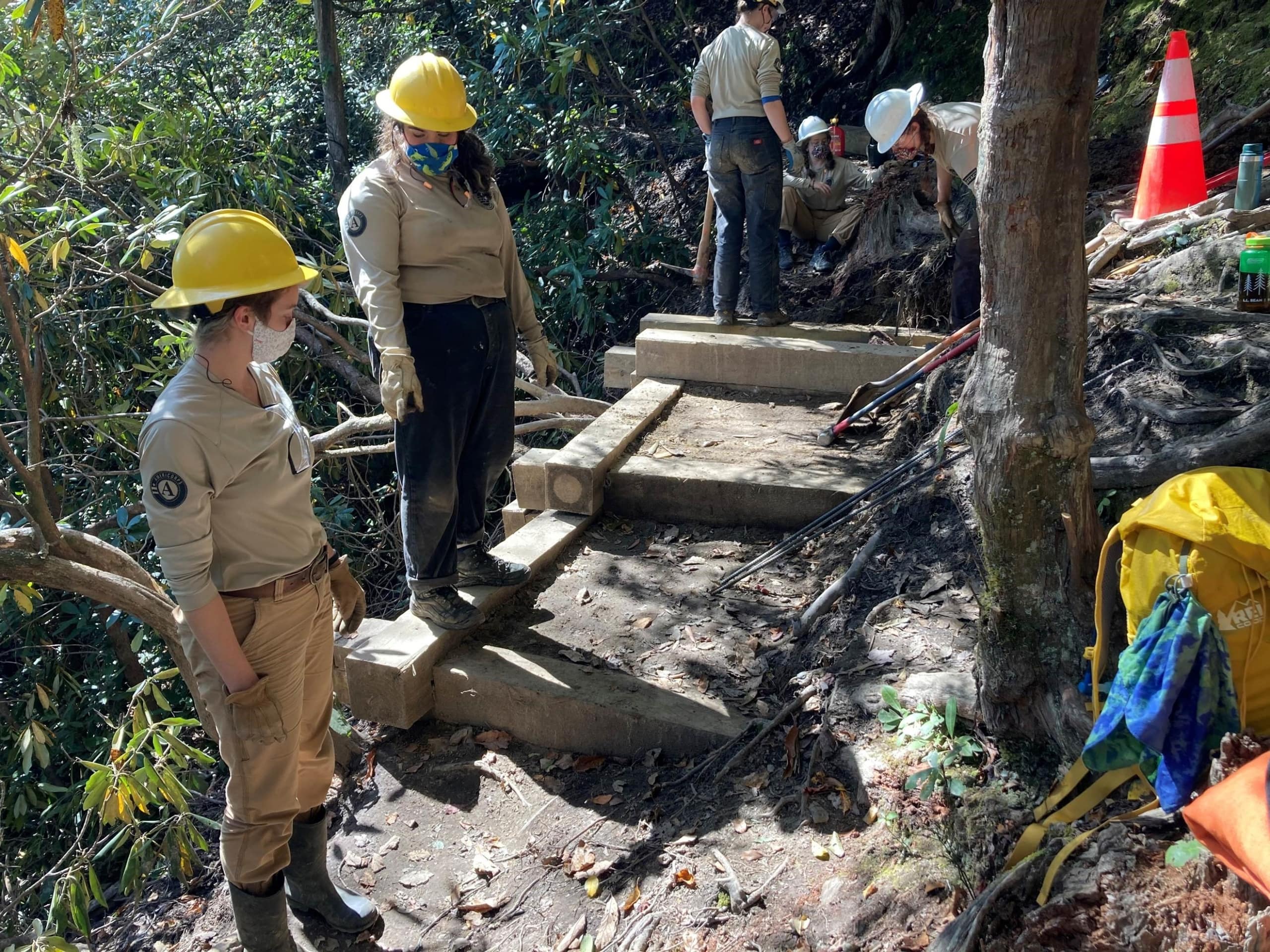
Now that the service term has ended, what are the Corps’members currently doing?
Andy: Two of them are on our Fire Crew, handling prescribed fire. One is a Trails Ambassador in upstate New York, and a few went to graduate school. A majority of the Corpsmembers are focusing on conservation and environmental service. All of them expressed that this program made them excited to explore more in conservation.
Have you noticed any change about yourself after serving with the Womxn of Linville crew? If so, in what ways?
Emily: My biggest takeaway is probably gratitude for the chance to meet, learn from, be vulnerable and grow alongside, and build lasting friendships with strong, smart, caring womxn, as well as pride in all we accomplished together.
Madeline: I noticed several changes in myself after serving on the womxn’s crew. I felt both physically and mentally stronger. I felt less reserved and more comfortable doing physical labor in the conservation field. I am no longer afraid to ask questions or for clarification if I am uncertain about aspects of a project. After my service term, I also found it easier to stand up for myself and others.
What are Conservation Corps North Carolina’s goals for the future?
Andy: For Summer 2021, we’ll at least have one more crew that will be an affinity crew that will work for the National Park Service and National Forest Service on the Blue Ridge Parkway. That crew will be 8 Corpsmembers, so we’ll be expanding the size. We’re also looking to expand our service with the National Park Service to further our single-identity crew past our capacity last year. We definitely want to develop more programs aimed at inclusion. DEI is a driving force in our program and Conservation Legacy and we’re always examining the capacity and where we can support in underserved areas.
What advice would you give to others considering a program like this?
Andy: My advice is don’t be scared to get your hands dirty and get out in the woods, rivers or mountains. It’s great to experience life and the natural world around where you can feel safe and have common interest in the people who surround you. You join this program with full ambition in knowing there are a lot of people like you getting into this [conservation] world as well.
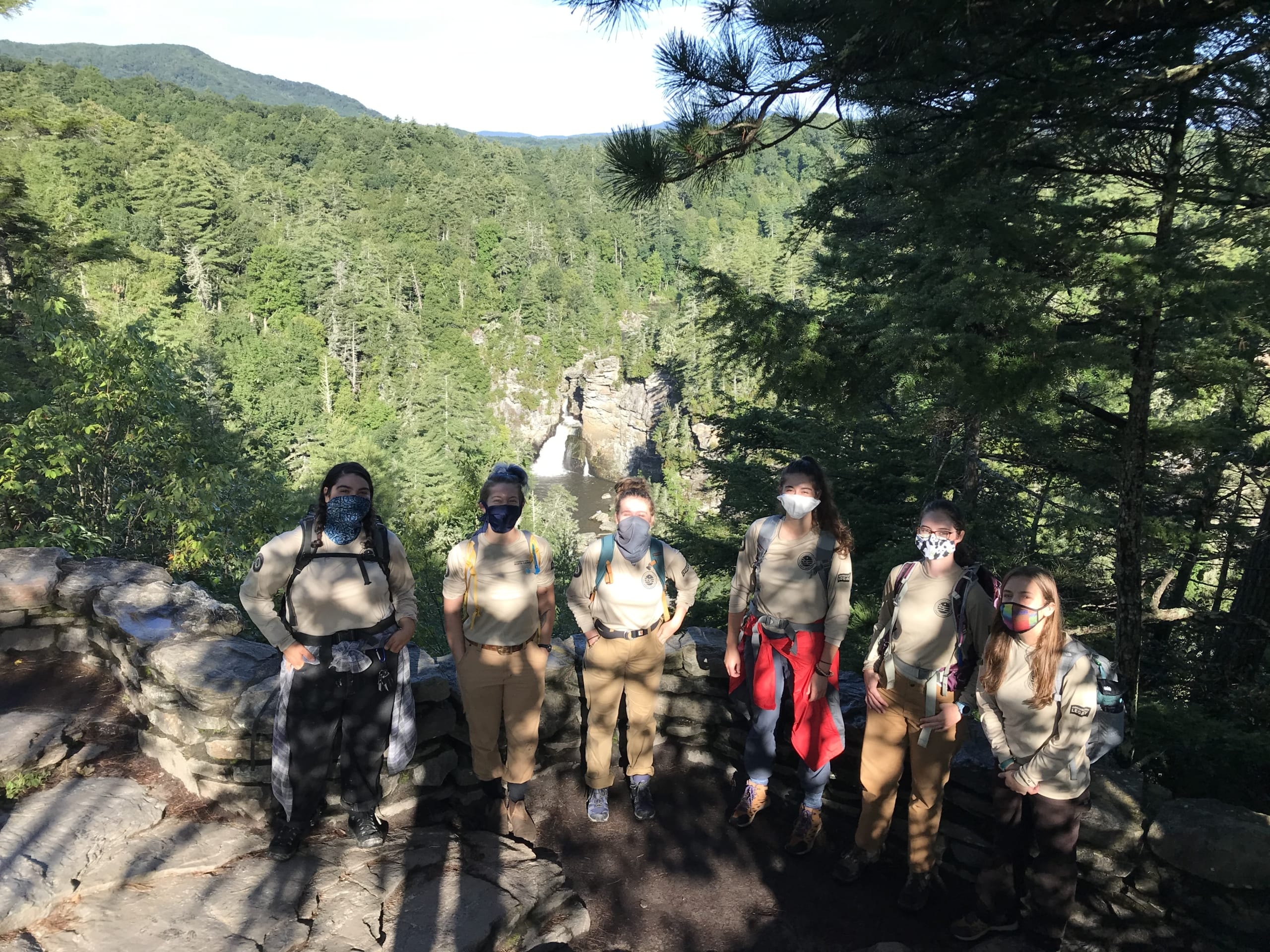
*Distinguished Womxn of Linville is a 2021 Project of the Year Nominee.

























